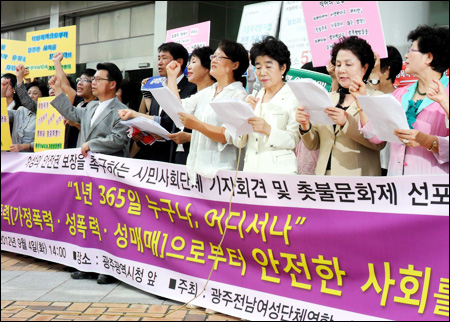Seoul to fight child abuse

Members of women’s organizations in Gwangju and across South Jeolla Province host a rally calling for tougher punishments for offenders who target women and for the provision of safety measures for victims of sexual assault, in front of Gwangju City Hall, Tuesday. The rally came amid a series of rapes including those committed against a housewife and a young girl. (Photo : Yonhap)
A 17-year-old girl living with her parents and a nine-year-old sister has endured her father’s violence for years.
The mother was alcoholic and was not able to protect the children.
Thinking the father might kill the mother and the little sister if she ran away from home, the girl put up with the father’s beating.
A community center staffer in charge of social welfare knew about this, and a child welfare center asked police to keep the father away from the children and to investigate him.
The mother was sent to a hospital for alcohol addiction treatment, and the children were moved to a welfare center.
Hundreds of children suffer from abuse in Seoul solely, with 841 cases taking place last year. And 84.3 percent of mistreatment cases involving children were inflicted by the birth parents, according to Seoul City on Tuesday.
“While most of child abuse occurs at home, people usually regard it as ‘family affairs’ and don’t actively report such cases to the authorities. But maltreatment against children is a serious violence which can affect their whole life. The public sector needs to be more involved in the issue,” a city official said.
Currently, there are seven child protection centers subsidized by the city government. From October, the city will operate one of the centers and take charge of accepting reports and conducting on-site investigation, while the rest will be run by private organizations in charge of treatment.
“When staffers of private organizations receive a report on child abuse and visit the family in question to investigate or to separate the victim from the parents, they can’t do so if the parents refuse. But if staffers of the public center visit, the parents won’t be able to refuse because the public staffers have legal authority to forcibly investigate,” she said.
The city government will adopt a prize-awarding system for those reporting ill-treatment against children.
It will also expand preventive measures, giving the public information on types of child abuse and ways of reporting.
“In a 2010 case where a father beat his three-year-old son to death because the boy cried and dumped the body to a garbage site, the neighbors said they heard the boy crying almost every day because of the father’s violence. If they had reported to police, the boy may not have died. We need to let people know what child abuse is and how they can report to authorities,” the official said.
A “group home” will also be set up to provide counseling and treatment to child abuse victims who are separated from the abusers.
If mistreatment takes place at nursery schools or welfare centers, the city will cancel their licenses, file a complaint against the abusers, and stop subsidizing them.
According to the city report, 841 child abuse cases took place in 2011, up from 730 a year before. About half of the total cases were parents’ abandonment or negligence in childcare, with physical, mental and sexual abuses following. <The Korea Times/Kim Rahn>























































